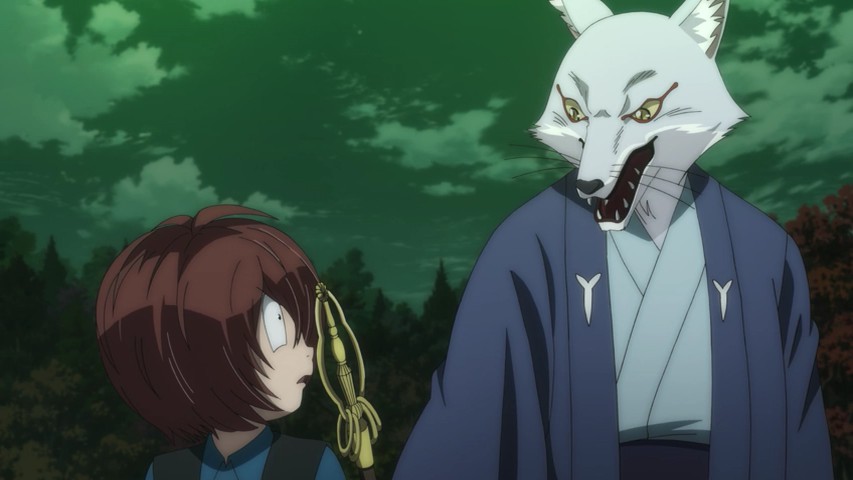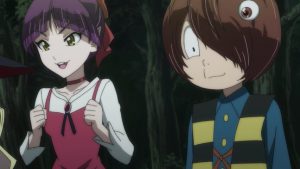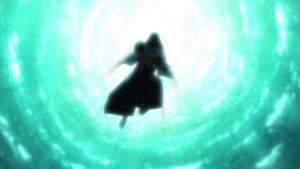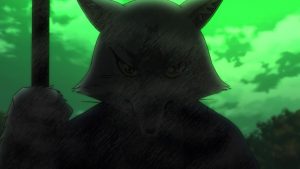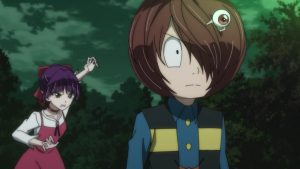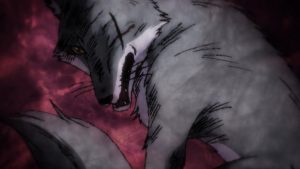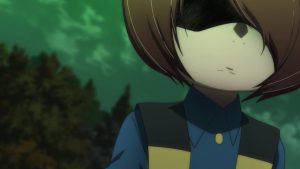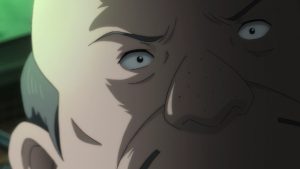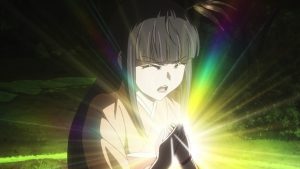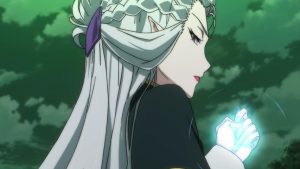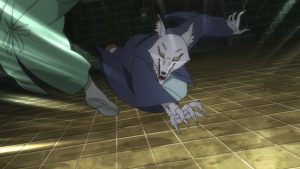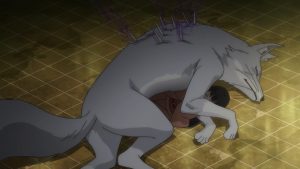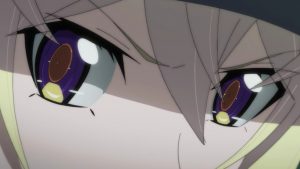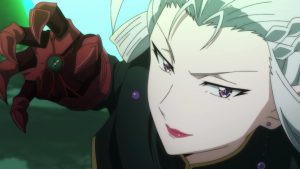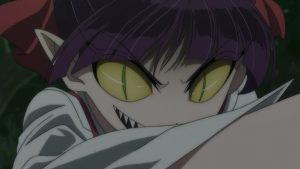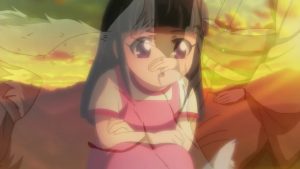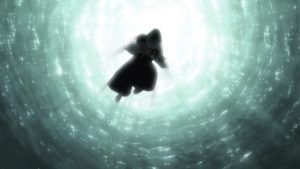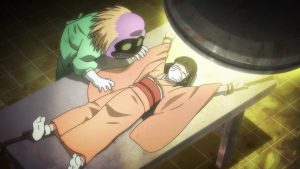 This episode of Gegege no Kitarou really felt like a reunion with a long-lost friend. Last week’s ep was a step in the right direction, but it’s been weeks – many, many weeks – since we’ve had one anywhere near as strong as this. I’m getting whiplash with this show – it started mostly off my radar, quickly blossomed into a core part of the rotation and culminated with what I still think was the best anime episode of 2018, and almost as quickly dropped back into mediocrity. I’m not counting any chickens here – one good episode doesn’t erase the past two months – but I certainly love having the GGGnK I love back.
This episode of Gegege no Kitarou really felt like a reunion with a long-lost friend. Last week’s ep was a step in the right direction, but it’s been weeks – many, many weeks – since we’ve had one anywhere near as strong as this. I’m getting whiplash with this show – it started mostly off my radar, quickly blossomed into a core part of the rotation and culminated with what I still think was the best anime episode of 2018, and almost as quickly dropped back into mediocrity. I’m not counting any chickens here – one good episode doesn’t erase the past two months – but I certainly love having the GGGnK I love back.
 At its best- well, at its very best this series is perhaps the most astute (and ruthless) series airing when it comes to social commentary. But generally speaking it’s at its best when it tracks similar ground to Natsume Yuujinchou – which of course was tracking similar ground to Mizuki Shigeru in the first place – in portraying the bittersweet consequences when the youkai world intersects with the human. Love is not bound by such distinctions, and Mizuki (and this updating of his mythology) have spun many classics from that thread.
At its best- well, at its very best this series is perhaps the most astute (and ruthless) series airing when it comes to social commentary. But generally speaking it’s at its best when it tracks similar ground to Natsume Yuujinchou – which of course was tracking similar ground to Mizuki Shigeru in the first place – in portraying the bittersweet consequences when the youkai world intersects with the human. Love is not bound by such distinctions, and Mizuki (and this updating of his mythology) have spun many classics from that thread.
 It’s clear something is off pretty quickly when Kuzumi-san (Asou Tomohisa, veteran of the 2007 series) posts a letter to the youkai mailbox asking for help with a youkai that’s targeting his daughter Yayoi (Aizawa Mai, also 2007). Something doesn’t smell right here, and Yayoi is clearly a caged bird (reflecting the progressive view of this series, Neko-musume is quite aghast at this). Her father says that he’s shielding her from her perpetual bad luck – but it turns out there’s a reason for that bad luck, and soon enough we found out what that is.
It’s clear something is off pretty quickly when Kuzumi-san (Asou Tomohisa, veteran of the 2007 series) posts a letter to the youkai mailbox asking for help with a youkai that’s targeting his daughter Yayoi (Aizawa Mai, also 2007). Something doesn’t smell right here, and Yayoi is clearly a caged bird (reflecting the progressive view of this series, Neko-musume is quite aghast at this). Her father says that he’s shielding her from her perpetual bad luck – but it turns out there’s a reason for that bad luck, and soon enough we found out what that is.
 The youkai in question is Hakusanbo, and he’s played by the great Takagi Wataru. Takagi’s voice is unmistakable and to say he’s iconic in Gegege no Kitarou history is an understatement – this is no less than his sixth edition of the franchise, and he starred as Nezumi-otoko in the 2007. He’s not interested in eating Yayoi, as Medama-oyaji initially says – that was his predecessor, the fifth Hakusanbo. This one says he wants to marry Yayoi, and produces a contract that her father agreed to 10 years earlier – the price extracted for the youkai’s help in turning Kuzumi’s business fortunes around.
The youkai in question is Hakusanbo, and he’s played by the great Takagi Wataru. Takagi’s voice is unmistakable and to say he’s iconic in Gegege no Kitarou history is an understatement – this is no less than his sixth edition of the franchise, and he starred as Nezumi-otoko in the 2007. He’s not interested in eating Yayoi, as Medama-oyaji initially says – that was his predecessor, the fifth Hakusanbo. This one says he wants to marry Yayoi, and produces a contract that her father agreed to 10 years earlier – the price extracted for the youkai’s help in turning Kuzumi’s business fortunes around.
 This development works elegantly on many levels. The twisting of causality Hakusanbo uses to change the father’s fortune wrought bad luck on his daughter, and he intentionally stayed close to protect her (though she didn’t realize it when he saved her life and she fell in love with him). It also explains why Backbeard’s ring turned up inside her body, avoiding that having been a coincidence for plot convenience. Most interestingly, though, it gives us a reminder of who Kitarou is, and who he isn’t. When he sees what’s happened, he tells Kuzumi he should honor the contract, period. When the man protests that Kitarou is supposed to be an ally of humans, Kitarou’s reply says everything – “I’m not anybody’s ally”. Kitarou exists in a lonely space between two worlds, and he does so by choice – this is the role he’s elected to play, but it’s not an easy one.
This development works elegantly on many levels. The twisting of causality Hakusanbo uses to change the father’s fortune wrought bad luck on his daughter, and he intentionally stayed close to protect her (though she didn’t realize it when he saved her life and she fell in love with him). It also explains why Backbeard’s ring turned up inside her body, avoiding that having been a coincidence for plot convenience. Most interestingly, though, it gives us a reminder of who Kitarou is, and who he isn’t. When he sees what’s happened, he tells Kuzumi he should honor the contract, period. When the man protests that Kitarou is supposed to be an ally of humans, Kitarou’s reply says everything – “I’m not anybody’s ally”. Kitarou exists in a lonely space between two worlds, and he does so by choice – this is the role he’s elected to play, but it’s not an easy one.
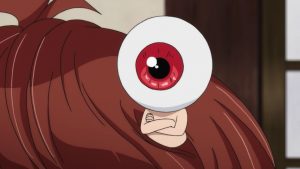 When Adele – accompanied by the creepy youkai Buer (Tatsuta Naoki, who’s been in eight versions of GGGnK, including twice earlier in this one), who’s a Western youkai but also a staple of Mizuki’s manga and earlier takes on the anime – arrives in Japan after sensing the ring, Hakusanbo proves both his courage and his dedication to Yayoi (I love that – of course – every detail of the “fox’s wedding” is just right). And Agnes resists the urge to forcibly extract the ring from Yayoi, although she knows it could save many lives if she did. This is a nuanced, layered story whose plot holds together on multiple levels – something we saw a lot of early in this series, but not so much lately. Whether it heralds a continuing return to form or not, it’s an entirely welcome development.
When Adele – accompanied by the creepy youkai Buer (Tatsuta Naoki, who’s been in eight versions of GGGnK, including twice earlier in this one), who’s a Western youkai but also a staple of Mizuki’s manga and earlier takes on the anime – arrives in Japan after sensing the ring, Hakusanbo proves both his courage and his dedication to Yayoi (I love that – of course – every detail of the “fox’s wedding” is just right). And Agnes resists the urge to forcibly extract the ring from Yayoi, although she knows it could save many lives if she did. This is a nuanced, layered story whose plot holds together on multiple levels – something we saw a lot of early in this series, but not so much lately. Whether it heralds a continuing return to form or not, it’s an entirely welcome development.


